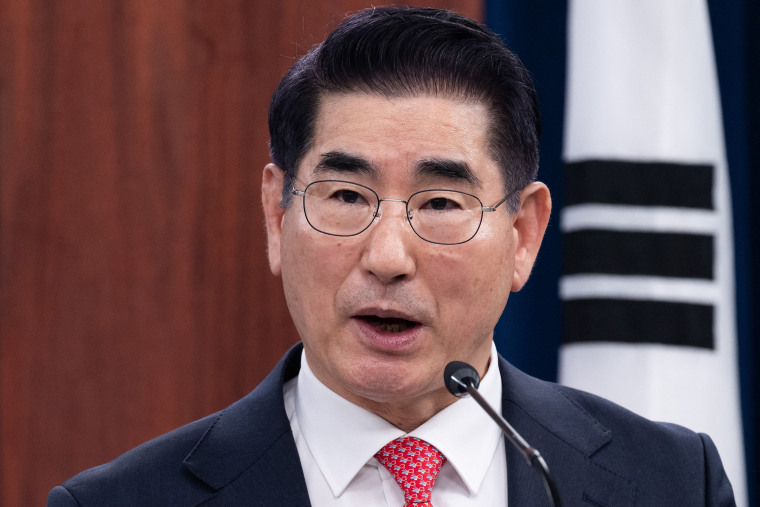SEOUL, South Korea — South Korean President Yoon Suk Yeol’s party vowed Thursday to oppose efforts to impeach him over his failed attempt to impose martial law in the East Asian democracy, as opposition lawmakers said they would vote on the motion on Saturday.
The announcement of the timing of the vote came as Yoon accepted the resignation of his defense minister, Kim Yong-hyun, who played a key role in the chaotic six-hour period of martial law that began late Tuesday local time and ended by Wednesday morning.
Choi Byung-hyuk, a retired four-star army general who is currently the South Korean ambassador to Saudi Arabia, was named as Kim’s successor.
“He is a trusted member of the military and a man of principle,” Chung Jin-seok, Yoon’s chief of staff, told reporters.

Kim had tendered his resignation on Wednesday, saying all responsibility for the debacle “lies with me alone.”
“All actions carried out by all military soldiers regarding the Emergency Martial Law were following my orders and directives, and so I bear the full responsibility for them,” he said in a statement.
Yoon’s office said Wednesday that his chief of staff and all senior presidential secretaries had also tendered their resignations. But it defended his declaration of martial law, South Korea’s first since 1980, as necessary in the face of an impasse with opposition lawmakers that Yoon said had paralyzed the government.
Under the martial law declaration, all political activity was banned and media was censored, drawing instant opposition from a public that lived for decades under military-authoritarian rule before South Korea transitioned into a vibrant democracy and the world’s 10th-largest economy.
Yoon, 63, rescinded the order after lawmakers defied a security cordon to enter the National Assembly in Seoul, the South Korean capital, where they voted unanimously to reject it. Protesters also arrived at the legislature, where some scuffled with security forces.
The lifting of the order did little to dispel public shock and anger. On Wednesday night, protesters in downtown Seoul held a candlelight vigil and marched against Yoon, calling on him to resign.

The main opposition Democratic Party said Thursday local time that lawmakers would vote on the Yoon impeachment motion on Saturday around 7 p.m. (5 a.m. ET). It was unclear whether lawmakers from Yoon’s People Power Party, or PPP, would vote against the motion or simply not show up for the vote.
A total of 191 lawmakers representing six opposition parties, plus one independent lawmaker, submitted articles of impeachment against Yoon on Wednesday. It takes a two-thirds majority vote in the unicameral National Assembly for the motion to pass.
Though PPP leaders repudiated Yoon’s martial law declaration and have asked him to leave the party, they said the party opposed the impeachment motion. The opposition bloc holds 192 seats, just under two-thirds of the 300-member legislature, meaning the motion could fail unless several PPP lawmakers break with their party and support it.

Opposition lawmakers say that if the motion fails to pass the first time, they will keep trying until Yoon is impeached. If the motion is passed, the Constitutional Court would then hold a trial to determine whether to confirm the impeachment, with a decision required within 180 days.
Though Yoon would remain at the presidential residence, his powers would be temporarily handed to Prime Minister Han Duck-soo until the court delivered its ruling.
U.S. Deputy Secretary of State Kurt Campbell said Wednesday that Yoon had “badly misjudged” his decision to declare martial law, and that seemingly everyone was “deeply surprised” by the move.
He said the fact that progressives and conservatives swiftly united in opposition to the order despite deep political divisions was a testament to the strength of South Korean democracy.
“This is a powerful symbol of the fact that people were prepared to come out and make clear that this was a deeply illegitimate process and that would be met by the will of the people,” he said at an event in Washington organized by the Aspen Strategy Forum, according to Reuters.
Antony Blinken, the U.S. secretary of state, acknowledged that the Biden administration did not know about Yoon’s announcement ahead of time but pushed back on the idea that there was an intelligence failure.
“We are certainly not routinely informed of every decision that any partner may be making anywhere around the world at any given time,” he said Wednesday in an interview with Reuters.
“What’s important now is to see this process play out peacefully and according to the constitution and the rule of law,” he added.
Stella Kim reported from Seoul, South Korea, and Jennifer Jett from Hong Kong.
